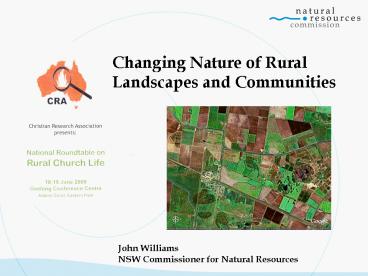Changing Nature of Rural Landscapes and Communities - PowerPoint PPT Presentation
1 / 23
Title:
Changing Nature of Rural Landscapes and Communities
Description:
Changing Nature of Rural Landscapes and Communities John Williams NSW Commissioner for Natural Resources The challenge for Australian agriculture – PowerPoint PPT presentation
Number of Views:75
Avg rating:3.0/5.0
Title: Changing Nature of Rural Landscapes and Communities
1
Changing Nature of Rural Landscapes and
Communities
John Williams NSW Commissioner for Natural
Resources
2
The challenge for Australian agriculture
- The era of cheap energy for Agriculture is
over..... - Fuels, Fertilizer, Pesticides, increasingly
expensive - The impact of Emission Trading Scheme is about to
begin..... - Increase costs of most inputs to agriculture
- The era of cheap food and fibre may be over....
- global food demand increasing-Food security.
3
BIODIVERSITY
LAND
AIR
WATER
4
Damage to Land, Water Biodiversity
- soil nutrient depletion
- soil acidification
- soil structural decline
- soil biological decline
- dryland and irrigation salinization
- wind and water erosion
- contamination with residues of agricultural
chemicals
5
Damage to Land, Water Biodiversity
- loss of habitat and biodiversity
- river processes and environmental flows
- nutrient, salts and pollutants to wetlands,
rivers and water bodies - contamination of groundwater with nutrients, salt
and pollutants - riparian, remnant vegetation damage and rural
tree decline - decline in native pastures and environmental
value of rangelands
6
The challenge for Australian society
- To manage water, land, biodiversity which
- underpin our life support systems by
- Providing our ecosystems services and our
ecological infrastructure - Under Climate Change and Shift
7
Change in atmospheric CO2 over the last 1000 years
- Based on ice core analysis, and since 1958 on
direct measurements - Inset Monthly average concentration at Mauna
Loa, Hawaii.
Source Australian Government, Bureau of
Meteorology
8
Climate observations compared to projections
Source Rahmstorf et al (2007). Science 316709.
9
Australia is warming
10
Climate change is occurring and is due to human
activities
11
Global Carbon Budget (1850-2005)
2000- 2005
1990- 1999
1980- 1989
fossil fuel emissions
6.3
7.2
5.4
Source
deforestation
1.6
1.5
1.4
CO2 flux (Pg C y-1)
atmospheric CO2
3.2
4.2
3.3
Sink
land
2.5
2.3
1.7
ocean
2.2
2.3
1.8
Time (y)
IPCC 2001 Canadell et al. 2007, PNAS, in review
IPCC WGI 2007, unpublished comparison
12
Summary of Projected Climate Changes
- Temperature to increase 3oC by 2050 and 5oC by
2070 over land areas - Lower increases in temperature in maritime
environments - Precipitation increases in high latitudes
(temperate) but a drying in mid-latitudes
(sub-tropics) over Asia - Equatorial tropical zone uncertain but little
mean change expected - No increase in cyclone frequency but intensity
could increase by 10-20 - Accelerated melting of glaciers 65 of Chinas
glaciers will not exist by 2050 with current and
projected warming trends - Sea level rise modest in IPCC projections (c.
50cm) but estimates dont include significant ice
melt over land
13
15-model average changes in temperature by 2030,
relative to 1990
Suppiah et al (in prep)
Low CO2 emission scenario
High CO2 emission scenario
Temperature change (C)
14
(No Transcript)
15
(No Transcript)
16
Annual Flows In Lachlan River at Forbes
16
4 July 2015
TYPE IN PRESENTATION NAME
17
Rainfall trend (1910 to 2005)
18
- Source Richard Beecham, NSW Department of
Natural Resources
19
- Source Barry Hanstrum, Bureau of Meteorology
20
(No Transcript)
21
(No Transcript)
22
(No Transcript)
23
(No Transcript)































